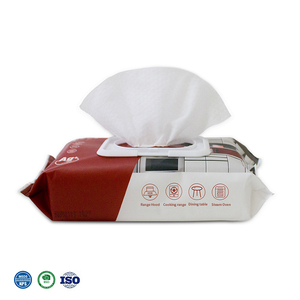(77 products available)
















































































































































































































































Wet laid spunlace nonwovens represent a versatile category of engineered fabrics with a wide array of applications. These materials are produced through a sophisticated process that entangles fiber webs using high-pressure water jets, resulting in a fabric with a flat, strong, and absorbent structure. This introduction explores the characteristics, production, and uses of wet laid spunlace nonwovens.
The production of wet laid spunlace nonwovens involves a series of steps that convert raw fibers into a cohesive fabric. The process begins with the formation of a fiber web, which is then subjected to multiple fine water jets that entangle the fibers. The resulting fabric is characterized by its uniformity, softness, and durability. Unlike traditional weaving or knitting, this method does not require interlacing yarns, which allows for the production of nonwovens with specific properties tailored to their intended use.
The application of wet laid spunlace nonwovens spans across various industries due to their adaptability and functional properties. In the medical sector, they are used to create disposable garments and bed covers, providing a sterile and protective barrier. The material's softness and absorbency make it ideal for personal care items such as wet wipes. Additionally, its strength and biodegradability are advantageous for producing eco-friendly shopping bags, offering a sustainable alternative to traditional plastics.
The environmental benefits of wet laid spunlace nonwovens are significant, particularly when made from natural fibers. These materials are often biodegradable and present a more sustainable option compared to synthetic alternatives. Their use in eco-friendly products aligns with growing environmental concerns and consumer demand for sustainable goods.
Beyond everyday items, wet laid spunlace nonwovens serve specialized functions such as filtration, due to their porous nature. They are integral in manufacturing items like diaper covers and bag linings. In civil engineering, nonwoven geotextiles are essential for soil stabilization and water drainage in large-scale outdoor projects. The versatility of wet laid spunlace nonwovens is further exemplified in thermal insulation products, where wool-based nonwovens provide excellent thermal retention.
In summary, wet laid spunlace nonwovens are a key material in various sectors due to their unique production process and functional properties. Their adaptability makes them suitable for a range of products, from disposable medical garments to durable geotextiles. As the industry evolves, the potential applications for wet laid spunlace nonwovens continue to expand, solidifying their position as an indispensable material in modern manufacturing.